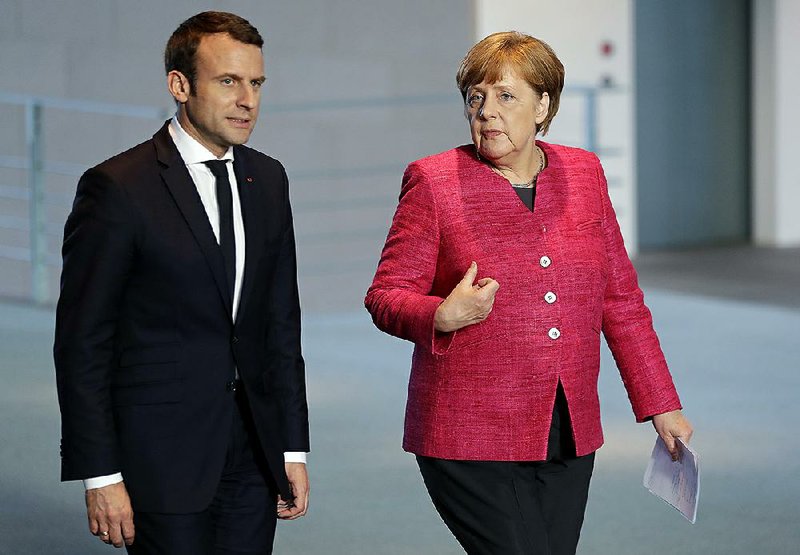BERLIN -- French President Emmanuel Macron and German Chancellor Angela Merkel pledged Monday to work closely together to draw up a "road map" of overhauls for the European Union, saying they're both prepared even to implement treaty changes if needed.
The two met in Berlin on Macron's first full day in office, which started with his naming 46-year-old lawmaker Edouard Philippe as his new prime minister. Merkel called Macron's visit an honor and a sign of the deep friendship between the two European powerhouses.
"We each represent the interests of our own countries, but the interests of Germany are naturally closely tied to the interests of France," Merkel said.
She added that she hoped for a "new dynamism" in German-French relations, saying that "Europe will only do well if there is a strong France, and I am committed to that."
Macron said he'd work with Merkel on a "road map" and that they needed to work on "deep reforms that are necessary and need common work."
Both leaders suggested they were prepared to change European treaties if needed, but Merkel stressed that such measures were not immediately on the table.
"First we need to work on what we want to change, and then if it turns out it needs a treaty change, then we're prepared to do that," Merkel said.
The visit to Berlin continued a tradition of French presidents making their first foreign trip to Germany.
A group of onlookers, some carrying European flags, stood outside the chancellery as Macron arrived.
Germany and France have traditionally been the motor of European integration, but the relationship has become increasingly lopsided over recent years as France struggled economically.
The visit signaled Macron's intentions to move rapidly on campaign promises to revive support for the beleaguered European Union.
In a nod to German concerns, Macron said at the news conference with Merkel that he had never pushed for jointly issued eurobonds and doesn't favor European countries taking joint responsibility for old debts.
Germany, which has Europe's biggest economy, has vehemently opposed taking direct responsibility for weaker eurozone countries' debts.
Macron added, however, that "what I know is that we have investments to make [in Europe], and so we have to work on investment mechanisms for the future."
The new prime minister, like Macron, is also relatively unknown to voters, fulfilling Macron's campaign promise to repopulate French politics with new faces.
Philippe is the mayor of the Normandy port of Le Havre, a trained lawyer and an author of political thrillers. His appointment marks a milestone in the rebuilding of France's political landscape, which has been dynamited by the election of Macron -- the first president of modern France not from the country's mainstream left or right parties.
Philippe is a member of the mainstream-right Republicans party and could attract other Republicans to Macron's cause, as the centrist president works to piece together a majority in parliament to pass his promised economic legislation.
Alain Juppe, a former French prime minister, called Philippe "a man of great talent" with "all the qualities to handle the difficult job."
In Berlin, Macron declined to answer a question about his new prime minister, only saying the choice of Philippe is part of the new political landscape he's promoting.
Macron is also seeking support from lawmakers on the left. At least 24 Socialists are now campaigning for re-election under the banner of Macron's Republic on the Move party.
But not everyone was pleased with Philippe's announcement.
For far-right leader Marine Le Pen, Macron's rival for the presidency, the selection of Philippe reflects a continuation of the system she hoped to break.
"This is the sacred alliance of the old right and left, united in their wish to remain in place at any price," Le Pen said in a statement. Defeated by a Macron landslide, she denounced what she predicted would be a continuation of old policies, including "austerity, submission to Brussels" -- the EU headquarters -- and "massive immigration."
The populist Le Pen said her National Front Party is now the only "true opposition" for June legislative elections.
French far-left leader Jean-Luc Melenchon, who won nearly 20 percent of the vote in the first round of the presidential election, also reacted with hostility.
Voters go to polls again in June to elect 577 National Assembly lawmakers. Melenchon urged them not to give Macron a parliamentary majority.
"The right has just been annexed, with a prime minister taken from its ranks, from the Republicans," Melenchon said. "Don't give full powers to Mr. Macron and his prime minister."
Information for this article was contributed by John Leicester and David Rising of The Associated Press.
A Section on 05/16/2017
